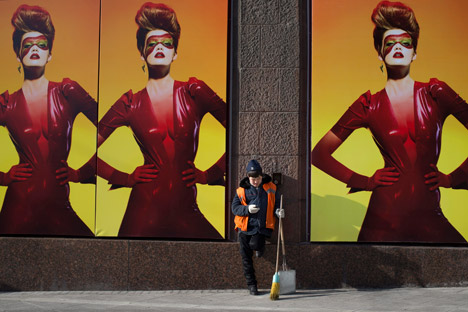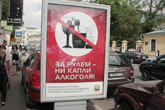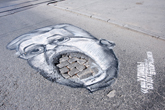Outdoor advertising operators pay big in Moscow

Following a cleanup of murky practices and more thorough regulation of Moscow's outdoor ad market, City Hall has earned a record $2.3 billion from an auction covering 60 percent of available space over the next 10 years. Source: AP
In late August, Moscow’s Media and Advertisement Department held an auction for 7,366 poster, stand and billboard spaces for 10 years. This represents around 60 percent of the total available spaces, according to the department’s estimates. Officials are counting on selling the remaining 40 percent by the end of this year.
The starting price of all 16 lots into which the spaces were consolidated was set at 22 billion rubles ($666.3 million) and increased to 75 billion rubles ($2.3 billion) as the bids poured in. This was one-third more than the department had projected.
To put this into prospective, the capital received 19 billion rubles ($575.5 million) from outdoor ad operators over the last 10 years. Thus, even if demand at the next auction is weaker and the starting price barely changes, the capital’s coffers will have received at least five times the previous year’s amount.
According to Espar Analytic, advertisers paid 19.7 billion rubles ($596.7 million) last year to promote their wares on Moscow’s street posters and billboards. Unlike for the officials, the auction results are hardly good news for outdoor ad operators.
Until now, small ad companies operated 30–40 percent of all spaces in the capital. However, with budget concerns at the top of their agenda, officials put the spaces for sale in big lots that smaller operators just could not afford.
A total of 22 companies took part in the auction, but only five came out on top — the country’s biggest outdoor ad operators, Russ Outdoor and Gallery, in addition to the lesser-known OOO Ilion, OAO Art and Production Association and OOO TRK.
According to two sources on the ad market, the last three acted on behalf of the Moscow operator Nike, the St. Petersburg operator RUAN Corporation and the Gema auto dealership holding, respectively.
Gema only started selling ad space in the Moscow Metro last year (a Gema spokesperson confirmed this, while Nike and RUAN Corporation did not return Vedomosti’s calls). According to Espar Analytic CEO Andrei Berezkin, a dozen or so operators had operated the spaces included in the auctioned lots.
The number of spaces has fallen, too. The government of Moscow took advantage of amendments to the law on advertising — in effect, to reset the market by refusing to extend contracts, most of which expired last spring. Simultaneously, the city has developed a uniform billboard placement arrangement, cutting the total available space by a claimed order of magnitude.
This is a self-serving calculation, Berezkin believes, since, in reality, Moscow’s ad space has shrunk by 25–50 percent at most. Gallery will operate fewer billboards than before the auction, but its market share will increase, because the total number of billboards will shrink, a company spokesperson said.
Russ Outdoor will operate 40 percent fewer billboards, while its market share will stay the same, according to its representative.
Related:
Russian government to ban fast food advertising
Doing Business: Moscow works on self-improvement
Officials expect to sign contracts with the auction winners within the next two months. Yet operators that did not take part or lost in the auction doubt that everything will go smoothly. First of all, they intend to challenge the auction rules and results in court, ad operator Anko’s CEO, Andrei Kovalyov, said.
Second, most billboards included in the officials’ new arrangement do not conform to building codes, so the auction winners will not be able to secure installation permits. A Media and Advertisement Department spokesperson disagreed: All the billboards have been duly approved.
To recover their costs (the auction winners will pay 20 percent up front and the rest over 10 years), the operators will be hiking ad prices, all Vedomosti sources said. Gallery’s spokesperson admitted that prices would rise — but the effectiveness of each billboard has increased, too, since their numbers have shrunk.
First published in Russian in Vedomosti.
All rights reserved by Rossiyskaya Gazeta.
Subscribe
to our newsletter!
Get the week's best stories straight to your inbox

